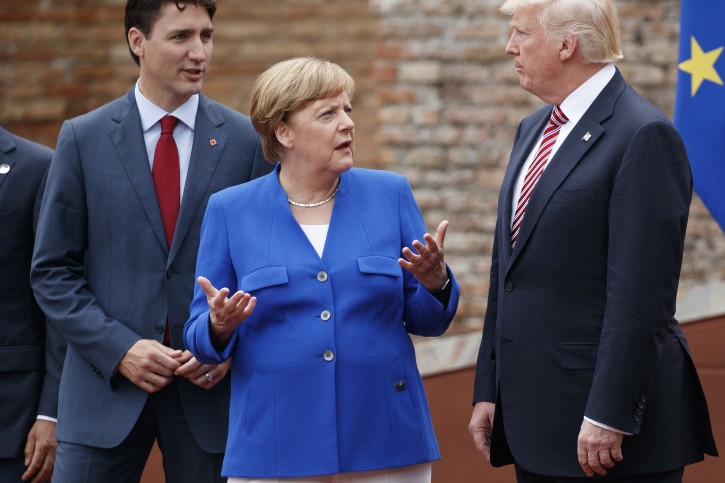Turns out nobody gives much of a damn what President Trump thinks.
The president may well come out against the Paris climate accord this week, after refusing in Taormina, Italy, to join the G7's “strong commitment” to “swiftly implement” the official global agreement ratified last year.
The world is moving on. Not just on the transition to the low-carbon economy, which is well underway. But on the whole agenda for sustainable development and climate action: the global goals for 2030.
Trump’s climate betrayal got most of the headlines as the final folly of his world tour. But more remarkable may have been the affirmation, by at least the G6, of the full 2030 vision. There is indeed a global agenda, and the leaders Germany, France, Canada, Great Britain, Japan and Italy are not afraid of proclaiming its virtues for their own people as well as the rest of the planet.
Global agenda
The leaders specifically called out the 2030 “agenda for sustainable development” that was unanimously endorsed by 193 countries in the halcyon days of 2015. That was the year as well of the against-all-odds climate agreement that history may show as the turning point in the epic race against global warming.
And that’s the plan the G7 is still on, with a raft of plans and mandates and commitments. Most countries — and investors —still choose the path of sustainable, inclusive prosperity. Transforming such lofty rhetoric into action, of course, is an open question. But the rhetoric itself is a stake in the ground around which all kinds of “agents of impact” can drive accountability and popular pressure.
Inequality is a systemic risk. The “Bari Policy Agenda on Growth and Inequalities,” adopted by finance ministers and central bank governors, takes on inequality, not just of income, as a brake on global growth and a driver of instability.
Closing gender gaps. The leaders embrace women and girls as “powerful agents of change” and gender equality as “not only right but smart for our economies.” Promoting women’s entrepreneurship and increasing women’s access to capital, networks and markets “can have dramatically positive economic benefits.” And yes, there’s a “G-7 Roadmap for a Gender-Responsive Economic Environment.”
Making maker jobs. The G7 is keen on the tech-driven rebirth of small-scale and local manufacturing, a megatrend it calls The Next Product Revolution. With the OECD and the International Labor Organization, the G-7 plan for skills and labor includes a strategic advisory board on ‘People-Centered Innovation.’
Investing in Africa. Leaders are looking well beyond 2030 to the African Union’s Agenda 2063. The financial world is looking forward to big injection of capital, but how big? The European Union’s new “External Investment Plan” is intended to boost investment in Africa. The G20 Partnership Initiative with Africa includes “investment compacts,” sustainable infrastructure and inclusive growth. Japan, for example, committed to invest more than $30 billion by 2018 at last year’s Tokyo International Conference for African Development.
Fighting poverty. The global project includes lifting 500 million people out of hunger and malnutrition by 2030. The G7 leaders agreed to raised their collective support for food security, nutrition and sustainable agriculture in Africa, specifically targeting women and girls. To attract investments, they endorsed blended finance and public-private partnerships (see ImpactAlpha’s archive, Full Stack Capital).
Into the breach
The setback on climate is huge, no doubt. Merkel was aghast (“unsatisfying”). The climate agreement was framed as a determination “to harness the significant economic opportunities, in terms of growth and job creation, offered by the transformation of the energy sector and clean technology.”
Some combination of Jerry Brown’s California, BlackRock and other shareholders, Michael Bloomberg and Mark Carney, James Baker and George Schultz, Bill Gates and hundreds of corporate CEOs, as well as tens of millions of Americans, may be able to step into the breach of Washington’s abdication of leadership on climate.
The majorities of Americans in every state in favor of strong climate action don’t have to tackle the climate challenge alone. Xi Jinping’s China is on the case, as is Narendra Modi’s India. Canada’s Justin Trudeau takes the helm of the G7 in the lead-up to next year’s summit in Charlevoix, Quebec. World leaders still have our back. For the moment, the 2030 global goals are holding.











